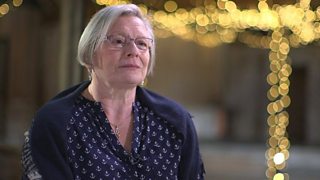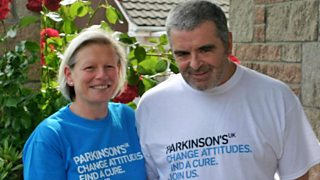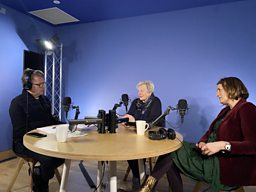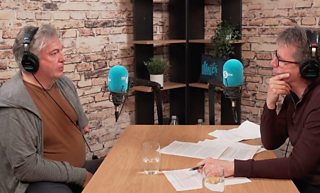What is a Super Smeller?
“I can diagnose Parkinson’s disease with my nose.”
Joy Milne has an extraordinary sense of smell. Her hereditary talent, known as hyperosmia, led her to the diagnosis of her husband Les’s disease. On his deathbed, he urged her to continue with this important work.
In Nicky Campbell’s ‘Different’ podcast, Joy explains how she honed her unique gift to help save and improve the lives of many, becoming a worldwide advocate in the process.
Here are six things Nicky learned about Joy’s hyperosmia and how she created change in the way we diagnose diseases today.

1. Joy inherited hyperosmia from her grandmother.
From the age of six, Joy’s grandmother was on a mission to help her master the technique.
“She would crush a leaf, a petal and switch them in her hand and I would smell which was which… I would smell the walls, the floor, people. She made it fun.”
Over time, Joy became a super-smeller, much like a professional ‘nose’ who works in the perfume industry. She learned to identify specific scents which are mixed together - not all of them pleasant, as she soon found out when she became a nurse.
2. Parkinson鈥檚 disease smells earthy and dank.
Everybody has their own individual smell, but Joy believes something changes when we become ill. She recalls noticing a difference in her husband’s scent.

“He had a wonderful musk smell. He really did…But then, just about when he was 31 or 32, I knew there was something wrong. It just got worse and worse and by the time he was 33, it was the dominant smell. His male musk smell had gone.”
When they went to a Parkinson’s UK meeting in Scotland, she immediately realised what it was.
“That was a really traumatic day. I had never smelled so much Parkinson’s in all my life.”
Les was also in the medical profession - a doctor - but hadn’t been officially diagnosed at that point. When they returned home after the meeting, he changed.
“He became alive again. He was more himself, wanting to catalogue all the early signs and symptoms. He was so animated that we could do this.”
3. Joy can detect four levels of Parkinson鈥檚.
Joy devised a basic test in preparation for the next Parkinson’s UK meeting, which involved the cunning use of chocolate biscuits and her acute sense of smell. It enabled her to pinpoint the progression of the disease at four key stages.
“Level one is the person, and I have to hunt for the Parkinsinson’s. Two is a bit less person. Three is almost fifty-fifty, perhaps a bit over. But four, I’ve only smelled a few times, and I can’t find the person. It is Parkinson’s.”
The odour is strongest when it is least controlled by outside influences such as medication or other non-pharmaceutical interventions such as diet and exercise.
4. Funding was needed for more research.
Prof. Perdita Barran from the University of Manchester heard about Joy’s work via Prof. Tilo Kunath at the University of Edinburgh. They devised an experiment to test Joy’s claims.

“We got six people with Parkinson’s and a control group of six people without Parkinson’s to wear teeshirts,” says Prof. Barran. “Then they took the teeshirts off and we cut them in half, put them into bags and gave them to Joy to smell.”
Not only did Joy get them all correct, she also re-matched the halves of the teeshirts to the specific people. Then she went one step further, suggesting that a member of the control group also had Parkinsons.
Nine months later, the person in the control group was diagnosed. It meant that, where other research funding applications had failed before, Joy and the team could now bolster their plea with the inclusion of this fresh case. It worked.
5. Other conditions have a distinctive smell too.
Joy has utilised her hyperosmia to help diagnose cancer and tuberculosis. She can now detect ten different types of cancers. In Tanzania, she worked with teams on groundbreaking techniques to identify TB.
“In Popote I worked with great African pouched rats, who have a superb sense of smell…They train them when they’re really quite small to detect it from the sputum.”
6. Joy is forbidden from diagnosing freely.
If Joy was in a social situation and detected Parkinson’s in somebody, she would have to remain silent due to current protocols.
“I have to walk away and sometimes it’s very, very hard… What would a doctor do if a person walked into the surgery and said ‘this woman has told me I may have Parkinson’s?’”
The research is robust - foolproof, according to Joy, but she says that until the wider medical fraternity fully understands how it works, she can’t say a word to unwitting carriers.

To hear more about what Joy can say, head to 成人快手 Sounds and search for Different with Nicky Campbell.



